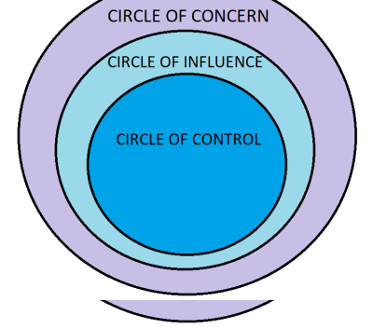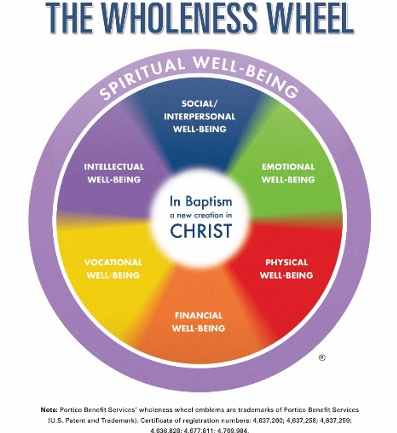Dear Friends in Christ,
“They are like trees planted by streams of water,
which yield their fruit in its season, and their leaves do not wither.
In all that they do, they prosper”
(Psalm 1:3)

If you’ve ever flown, you’ve certainly heard this announcement: “In the unlikely event of a loss of cabin pressure, panels above you will open revealing oxygen masks. Reach up and pull the mask towards you. Place it over your nose and mouth, and then secure it with the elastic band that can be adjusted to ensure a tight fit. Secure your own mask first before attempting to help others”.
That last point is particularly important. Securing your own oxygen mask first is not only true in the event of a cabin pressure emergency; it’s true in any crisis. We can’t take care of others unless we take care of ourselves.
Think about Jesus. Whenever Jesus faces a major crisis or a life changing experience, He takes time away by himself, to pray, to ponder, and to prepare for what is ahead. Whether He is praying alone on the top of a mountain after the death of John the Baptist (Matthew 14:23) or praying in the Garden of Gethsemane to prepare for His own death (Matthew 26:36-46), Jesus takes the necessary time to “get away” in order to stay grounded.
Staying Grounded: Circles
One of the best ways to stay grounded is to practice keeping the proper perspective. Take a moment to consider the differences among the following three circles: Circle of Control, Circle of Influence, and Circle of Concern. I first learned about these three circles in Stephen Covey’s book, 7 Habits of Highly Effective People

1. Circle of Control. You are the one thing (and the only thing) you have total control over. This circle should be your first priority, especially in a crisis.
2. Circle of Influence. You have influence over your family, your parish, and, to some extent, your local community. This should be your next set of priorities.
3. Circle of Concern. You have no control and probably little influence over the entire nation and world. This should be your last priority.
In a crisis, people often get the circles backward. I certainly did during the first week of the COVID 19 crisis. My Circle of Concern became my top priority and my Circle of Control, my last priority. While leading through a crisis this is dangerous.
Think about the circles of Jesus. Jesus had his Circle of Control. Think of His prayerfulness, His great love for those in need, His pursuit of justice, and His willingness to sacrifice in order to save. Jesus had His Circles of Influence. There was the “inner circle” of Peter, James, and John. The circle of the Twelve Disciples. The circle of the seventy missionaries. And the great circle of all those who followed Him, including women like Mary Magdalene, the other Mary, and Salome. Jesus had His Circle of Concern, which for Jesus includes everyone and everything, including the salvation of the world and the renewal of all creation. One of the best ways to stay grounded is to follow Jesus and to focus on the proper perspective.
Staying Grounded: Habits
We can’t take care of our families, the parish, the synod, or anyone else if we don’t first take care of ourselves. In a crisis, a leader must stay grounded. Daily habits and rituals help me to stay grounded. One of the resources I have found tremendously helpful for establishing grounding habits is the Portico Wholeness Wheel, and the Seven Areas of Well-Being.

Portico’s Seven Areas of Well-Being
1. Social-Interpersonal: We are created by God to be social beings. We are not made to be alone. It is important for us to take time to nurture the beautiful relationships God blesses us with. “Therefore encourage one another and build up each other, as indeed you are doing” (1 Thessalonians 5:11).
2. Emotional: We are called by God to recognize and honor our own emotions and feelings, and those of others. Fostering “emotional intelligence” will help us live a full and abundant life. Jesus once said, “…I came that they may have life, and have it abundantly” (John 10:10b).
3. Physical: We are called to care for our physical bodies through proper nutrition, good rest, and regular exercise. We honor our bodies as a gift of God. “Or do you not know that your body is a temple of the Holy Spirit within you, which you have from God, and that you are not your own?” (1 Corinthians 6:19)
4. Financial: We are called to be wise and good stewards of all that God has given us, and this stewardship should be evident in the way we save, spend, and share. “And God is able to provide you with every blessing in abundance, so that by always having enough of everything, you may share abundantly in every good work” (2 Corinthians 9:8).
5. Vocational: We are called by God to love God, follow the example of Jesus, and live a life of meaning, purpose, and service to others. We are given the opportunity to partner with God to renew all creation. “We know that all things work together for good for those who love God, who are called according to his purpose” (Romans 8:28).
6. Intellectual: We are called to grow in our intellect, insight, and understanding. Stay curious, ask questions, and seek God’s wisdom and truth. We also know the importance of fostering both an active mind and a mind that is at rest. “Let the same mind be in you that was in Christ Jesus” (Philippians 2:5).
7. Spiritual: We are called to nurture our relationship with God through the practices of prayer, Scripture, devotions, and worship. These habits, practices, and rituals help to remind us who we are (Children of God) and whose we are. “I am the vine; you are the branches. Those who abide in me and I in them bear much fruit, because apart from me you can do nothing” (John 15:5)
At this time, I would invite you to set aside one hour, and ground yourself in each area of the Portico Wholeness Wheel. Prayerfully and carefully work through each of the Seven Areas of Well-Being and develop one simple habit (to start doing, to stop doing, or to continue doing) that you will maintain for the next 90 days (April 15 to July 15, 2020). In order to help you “stay grounded” I encourage you to recruit an accountability partner (spouse, family member, colleague, or friend). We always achieve our best, when we achieve it together.
Below this “working list” I share my own list as an example.
(insert your name here)’s “Staying Grounded” Habits
- Social-Interpersonal:
- Emotional:
- Physical:
- Financial:
- Vocational:
- Intellectual:
- Spiritual:
Bishop Daniel G. Beaudoin’s “Staying Grounding” Habits
- Social-Interpersonal: I will continue to stay connected to my friends in the Toledo Running Community by participating in our Virtual Running Club using Strava (Facebook for runners) to record and share my solo runs
- Emotional: I will limit my daily news and social media consumption.
- Physical: I will continue to do my simple morning strength training at home: pushups, crunches, squats, and planks
- Financial: I will stop my daily morning Tim Horton’s coffee stop, even though it pains me to no end.
- Vocational: I will complete the Lilly School of Philanthropy on-line Fundraising Course: Developing Annual Sustainability, and leverage that learning to help our synod pursue its God given mission
- Intellectual: I will read daily from good professional books with a focus on fundraising, leadership, and the Jerusalem Collection in 2 Corinthians
- Spiritual: I will continue to pray daily using the Daily Texts 2020
Five Final Points to Ponder
1. When leading through a crisis, we need to pursue balanced, clear thinking. Staying grounded is key. This is one of the main reasons I read Scripture every morning. It grounds me in the ways and the will of God, and helps me to practice Godly thoughts, words, and actions.
2. When leading through a crisis, we need to be aware of how our news and social media consumption affects us. We only have so much emotional and intellectual bandwidth. Do we want to dedicate our limited attention to absorbing more and more information? Especially information that is far outside our areas of control or influence? Turn off the 24-hour news cycle and get off the ELCA Clergy Facebook page. It’s a train wreck!
3. When leading through a crisis, it’s important to pay attention to our language. Words matter. They shape the perception of reality. As leaders, they also shape other peoples’ perception of reality. If our language is alarmist, we will alarm others. People often exaggerate what leaders say, so we should be thoughtful and measured. As leaders, we need to choose our words prayerfully and carefully.
4. When leading through a crisis, it’s important to remain connected to the mission and vision. In a crisis, mission and vision are life and death issues. When we fail to stay connected to a hope filled future, we are tempted to give up and quit. Vision is “who and what we will become”; mission is “what we are called to do”; and strategy is “how we do it”. We want to stay committed to the vision and mission, but flexible with the strategy.
During this crisis, we may be tempted to avoid talking about the vision and mission, but that is a huge mistake. In a crisis, people need to be reminded of where God is leading us and what we’re fighting for. Clearly articulating the vision and mission again, and again, and again, keeps us focused on what we are called to do and who we are called to become. Mission and vision are antidotes to fear. Fear is contagious. But so is hope. Mission and vision create hope.
5. When leading through a crisis, it’s important to pay attention to our health. Self-care is a leadership discipline, so please focus on sufficient sleep, proper nutrition, and regular exercise. Without these health practices, we are less mentally focused, more easily distracted, and less resilient. The people God is calling us to lead need us to be healthy and whole.